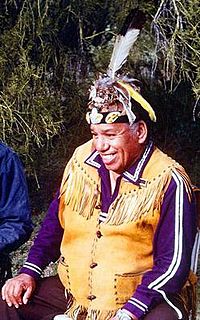Wallace "Mad Bear" Anderson facts for kids
Quick facts for kids
Wallace "Mad Bear" Anderson
|
|
|---|---|
 |
|
| Born |
Wallace Anderson
November 9, 1927 |
| Died | December 10, 1985 (aged 58) |
| Nationality | American, Tuscarora |
| Occupation | Activist |
| Military career | |
| Allegiance | |
| Service/ |
|
| Battles/wars | World War II Korean War |
Wallace "Mad Bear" Anderson (November 9, 1927 – December 10, 1985) was a brave Tuscarora Native American leader. He became famous in the 1950s for speaking up for Native American Sovereignty. This means he fought for Native American nations to have the right to govern themselves.
When he was a child, his grandmother gave him the nickname "Mad Bear" because he had a strong personality. As a young man, he joined the U.S. Navy. He served during World War II in Okinawa and later in Korea during the Korean War. Wallace Anderson became an activist for Native American rights after facing a problem with a loan for his home.
Standing Up for Rights: Tax Protests
In 1957, Wallace Anderson led protests against taxes. The Iroquois people were being asked to pay New York State income taxes. Several hundred Akwesasne Mohawks marched to a courthouse in Massena, New York. They burned official papers that demanded unpaid taxes. This was a strong way to show they disagreed with the tax demands.
Protecting Their Land: The Reservoir Protest
The Power Authority of the State of New York wanted to build a large reservoir. This project would flood parts of the Tuscarora Reservation land. Wallace Anderson was a key leader in the protests against the Tuscarora Reservoir.
He helped block surveyors from entering the reservation. He also let air out of workers' tires and lay in the road to stop trucks. Despite these efforts, the U.S. Supreme Court eventually decided that taking the land was legal. The reservoir was then built.
Declaration of Sovereignty
In March 1959, Wallace Anderson helped lead an important event. This was a declaration of sovereignty at the Six Nations Reserve in Brantford, Ontario. This reserve was founded by Joseph Brant.
After this declaration, twelve Royal Canadian Mounted Police entered the reserve's council house. However, the Iroquois people bravely forced them to leave. This showed their strong belief in their right to self-governance.
 | Janet Taylor Pickett |
 | Synthia Saint James |
 | Howardena Pindell |
 | Faith Ringgold |

